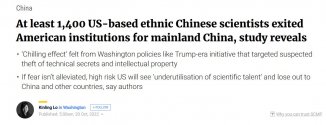Keep 'em coming.... watch Amerikkka's average national IQ drop like kid at a school shooting....

At least 1,400 US-based ethnic Chinese scientists switched their affiliation last year from American to Chinese institutions, according to a joint report by academics from Harvard, Princeton and the Massachusetts Institute of Technology.
The high number illustrates a “chilling effect” resulting from US government policies deterring research and academic activity by scientists of Chinese descent and suggests American research could suffer, said the Asian American Scholar Forum, an advocacy group that published the findings.
“We see an increase in that trend,” said Yu Xie, a sociology professor at Princeton University as he presented the report at a webinar on Monday. He added that the US had been “losing talent to China for a while and particularly after the China Initiative”.
The China Initiative, launched in 2018 by the administration of former US president Donald Trump, aimed to fight suspected Chinese theft of technical secrets and intellectual property as competition between the two countries intensified.
While the administration of US President Joe Biden formally ended the programme this year amid concerns over racial bias and a culture of fear, it still exacted a lingering toll on Chinese-descent scientists, according to the report.
“Our study reveals the widespread fear among Chinese-origin scientists in the US arising from conducting routine research and academic activities,” Xie and his four fellow authors from the three US universities concluded.
“If this fear is not alleviated, there are significant risks of an underutilisation of scientific talent as well as losing scientific talent to China and other countries,” they added.
The data collected by the authors indicated that 1,415 scientists of Chinese origin, as identified by their last names, had changed their professional affiliations. These changes were identified in addresses listed under the scientists’ names in academic journals. They worked in engineering, computer science, mathematics, physical sciences and life sciences.
The figure marked a 21.7 per cent jump from the previous year, and is more than twice the number of switched affiliations compared with 2011.
Since the launch of the China Initiative, critics said Chinese scientists in the US, including Chinese-Americans, felt they were being racially profiled and pressured to shut down joint projects and avoid future collaboration with Chinese counterparts.
A poll last year by researchers at the University of Arizona and the Committee of 100, a non-partisan organisation of prominent Chinese-Americans, found 40 per cent of scientists who are ethnic Chinese considered leaving the US due to a fear of American government surveillance.
A similar sentiment was reflected in the AASF report, which surveyed 1,300 “Chinese-origin scientists” employed by US universities in tenure or tenure-track positions between last December and March this year. Of these, 54.4 per cent were naturalised American citizens and another 36.8 per cent were US permanent residents.
The report found that 61 per cent of the scientists, especially young researchers, felt pressure to leave the US, and 65 per cent expressed concern about their collaborations with China. About 45 per cent of the respondents said they were avoiding applying for US federal grants.
Christina Ciocca Eller of the White House’s Office of Science and Technology Policy said the US government’s policies had a direct impact on well-being in the research ecosystem in both “beneficial” and “difficult” ways. Ciocca Eller said the Biden administration would keep striving to protect research security and improve policies.
“We have to take research security challenges with care … especially if we want to facilitate the trust and openness that is at the heart of the American research enterprise,” she explained at the webinar.
Ciocca Eller said her office, which develops and implements research security policies for the Biden administration, was now trying to standardise and be more transparent when it came to research applications for federal funding.
“If our policies to address the challenges posed in relation to research security diverge from our core values or fuel xenophobia or prejudice of any kind, then we will significantly diminish our ability to attract and retain scientific talent or to facilitate productive international collaboration,” she added.
The China Initiative was formulated as part of the Trump administration’s response to Beijing’s Thousand Talents Plan, set up in 2008 to attract foreign talent as part of the central government’s strategy “for foreign technology acquisition”.
There were 77 cases and more than 150 defendants prosecuted under the China Initiative over three years, according to MIT Technology Review’s analysis in December 2021.
The FBI said in January some 2,000 investigations focused on the Chinese government stealing information and technology, but it did not specify how many of these came under the China Initiative.
Meanwhile, US universities appeared to have reacted differently when their employees were indicted, with some quickly firing professors and distancing themselves, while others openly supported their staff during the prosecutions.
Tobin Smith, senior vice-president for science policy and global affairs at the Association of American Universities, said some institutions were confused about rules on federal grants.
He believed there needed to be across-the-board collaboration between the government and different levels at universities ranging from the leadership to their faculties.
“Let’s face it, there have certainly been government policies in the China Initiative which I think have created perhaps some of these challenges and concerns … but as universities, we need to get it right too,” said Smith, whose organisation represents 65 research universities in the US and Canada.
He called for better collaboration between universities and government “when there are issues of concern about disclosure” to set punishment appropriate to the crime.
“We want to work with the Asian American Scholars Forum, other Asian-American groups [and] OSTP federal research agencies to work on getting this right because we need to protect and ensure that we continue to attract that talent, which is proven so valuable to our universities and the research we do as a country,” Smith said.

At least 1,400 US-based ethnic Chinese scientists switched their affiliation last year from American to Chinese institutions, according to a joint report by academics from Harvard, Princeton and the Massachusetts Institute of Technology.
The high number illustrates a “chilling effect” resulting from US government policies deterring research and academic activity by scientists of Chinese descent and suggests American research could suffer, said the Asian American Scholar Forum, an advocacy group that published the findings.
“We see an increase in that trend,” said Yu Xie, a sociology professor at Princeton University as he presented the report at a webinar on Monday. He added that the US had been “losing talent to China for a while and particularly after the China Initiative”.
The China Initiative, launched in 2018 by the administration of former US president Donald Trump, aimed to fight suspected Chinese theft of technical secrets and intellectual property as competition between the two countries intensified.
While the administration of US President Joe Biden formally ended the programme this year amid concerns over racial bias and a culture of fear, it still exacted a lingering toll on Chinese-descent scientists, according to the report.
“Our study reveals the widespread fear among Chinese-origin scientists in the US arising from conducting routine research and academic activities,” Xie and his four fellow authors from the three US universities concluded.
“If this fear is not alleviated, there are significant risks of an underutilisation of scientific talent as well as losing scientific talent to China and other countries,” they added.
The data collected by the authors indicated that 1,415 scientists of Chinese origin, as identified by their last names, had changed their professional affiliations. These changes were identified in addresses listed under the scientists’ names in academic journals. They worked in engineering, computer science, mathematics, physical sciences and life sciences.
The figure marked a 21.7 per cent jump from the previous year, and is more than twice the number of switched affiliations compared with 2011.
Since the launch of the China Initiative, critics said Chinese scientists in the US, including Chinese-Americans, felt they were being racially profiled and pressured to shut down joint projects and avoid future collaboration with Chinese counterparts.
A poll last year by researchers at the University of Arizona and the Committee of 100, a non-partisan organisation of prominent Chinese-Americans, found 40 per cent of scientists who are ethnic Chinese considered leaving the US due to a fear of American government surveillance.
A similar sentiment was reflected in the AASF report, which surveyed 1,300 “Chinese-origin scientists” employed by US universities in tenure or tenure-track positions between last December and March this year. Of these, 54.4 per cent were naturalised American citizens and another 36.8 per cent were US permanent residents.
The report found that 61 per cent of the scientists, especially young researchers, felt pressure to leave the US, and 65 per cent expressed concern about their collaborations with China. About 45 per cent of the respondents said they were avoiding applying for US federal grants.
Christina Ciocca Eller of the White House’s Office of Science and Technology Policy said the US government’s policies had a direct impact on well-being in the research ecosystem in both “beneficial” and “difficult” ways. Ciocca Eller said the Biden administration would keep striving to protect research security and improve policies.
“We have to take research security challenges with care … especially if we want to facilitate the trust and openness that is at the heart of the American research enterprise,” she explained at the webinar.
Ciocca Eller said her office, which develops and implements research security policies for the Biden administration, was now trying to standardise and be more transparent when it came to research applications for federal funding.
“If our policies to address the challenges posed in relation to research security diverge from our core values or fuel xenophobia or prejudice of any kind, then we will significantly diminish our ability to attract and retain scientific talent or to facilitate productive international collaboration,” she added.
The China Initiative was formulated as part of the Trump administration’s response to Beijing’s Thousand Talents Plan, set up in 2008 to attract foreign talent as part of the central government’s strategy “for foreign technology acquisition”.
There were 77 cases and more than 150 defendants prosecuted under the China Initiative over three years, according to MIT Technology Review’s analysis in December 2021.
The FBI said in January some 2,000 investigations focused on the Chinese government stealing information and technology, but it did not specify how many of these came under the China Initiative.
Meanwhile, US universities appeared to have reacted differently when their employees were indicted, with some quickly firing professors and distancing themselves, while others openly supported their staff during the prosecutions.
Tobin Smith, senior vice-president for science policy and global affairs at the Association of American Universities, said some institutions were confused about rules on federal grants.
He believed there needed to be across-the-board collaboration between the government and different levels at universities ranging from the leadership to their faculties.
“Let’s face it, there have certainly been government policies in the China Initiative which I think have created perhaps some of these challenges and concerns … but as universities, we need to get it right too,” said Smith, whose organisation represents 65 research universities in the US and Canada.
He called for better collaboration between universities and government “when there are issues of concern about disclosure” to set punishment appropriate to the crime.
“We want to work with the Asian American Scholars Forum, other Asian-American groups [and] OSTP federal research agencies to work on getting this right because we need to protect and ensure that we continue to attract that talent, which is proven so valuable to our universities and the research we do as a country,” Smith said.


